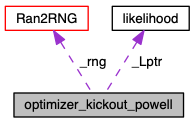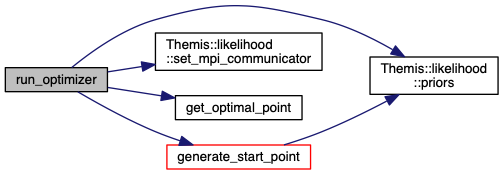Powell scheme optimizer with repeated kickouts for likelihoods.
More...
#include "optimizing/optimizer_kickout_powell.h"
|
|
| optimizer_kickout_powell (int seed) |
| | Class constructor, accepts the integer seed for a random number generator as an argument.
|
| |
| std::vector< double > | run_optimizer (likelihood &L, int dof_estimate, std::string optimizer_results_filename="Opt.dat", size_t number_of_instances=0, size_t number_of_restarts=2, double tolerance=1e-10) |
| | Function to run the optimizer, takes a likelihood object, vector of priors, name of an optimizer output file, and tuning parameters for the optimizer. More...
|
| |
| std::vector< double > | run_optimizer (likelihood &L, int dof_estimate, std::vector< double > start_parameter_values, std::string optimizer_results_filename="Opt.dat", size_t number_of_instances=0, size_t number_of_restarts=2, double tolerance=1e-10) |
| | Function to run the optimizer, takes a likelihood object, vector of priors, name of an optimizer output file, and tuning parameters for the optimizer. More...
|
| |
| std::vector< double > | run_optimizer (likelihood &L, int dof_estimate, std::vector< std::vector< double > > start_parameter_values, std::string optimizer_results_filename="Opt.dat", size_t number_of_restarts=2, double tolerance=1e-10) |
| | Function to run the optimizer, takes a likelihood object, vector of priors, name of an optimizer output file, and tuning parameters for the optimizer. More...
|
| |
| void | set_cpu_distribution (int num_likelihood) |
| | Function to set the distribution of processors in different layers of parallelization. More...
|
| |
| void | set_kickout_parameters (double kickout_loglikelihood_reduction_factor=10.0, size_t kickout_itermax=20, size_t kickout_rounds=20) |
| | Function to set the meta-parameters associated with the kickout procedure. More...
|
| |
|
| std::vector< double > | generate_start_point (likelihood &L) |
| | Function to generate a random starting point given the bounds on the prior. Assumes an arctan distribution if both bounds on the prior are infinity, an exponential distribution if the bound on one side is infinity, and a uniform distribution if both bounds are finite. More...
|
| |
| double | get_optimal_point (std::vector< double > &pvec, double tolerance, int itermax=0) |
| | Function to ncapsulate the process of optimization. Returns the maximized likelihood and resets pvec to the optimal position. More...
|
| |
|
double | func (double p[]) |
| |
|
double | tempered_func (std::vector< double > p, double prior_edge_beta=1.0) |
| |
|
double | f1dim (double x) |
| |
|
void | powell (double p[], double **xi, double ftol, int &iter, double &fret, int itermax=0) |
| |
|
void | linmin (double p[], double xi[], double &fret) |
| |
|
double | brent (double ax, double bx, double cx, double tol, double &xmin) |
| |
|
void | mnbrak (double *ax, double *bx, double *cx, double *fa, double *fb, double *fc) |
| |
|
|
likelihood * | _Lptr |
| |
|
size_t | _ndim |
| |
|
int | _num_likelihood |
| |
|
Ran2RNG | _rng |
| |
|
double | _prior_edge_beta |
| |
|
int | _dof_estimate |
| |
|
double | _ko_ll_red_fac |
| |
|
size_t | _ko_itermax |
| |
|
size_t | _ko_rounds |
| |
|
double * | _pcom |
| |
|
double * | _xicom |
| |
Maximizes a given likelihood using the tempered_powell method as described in Numerical Recipes in C (1992; Press, Teukoslky, Vetterling and Flannery). An attempt to generate a global maximum is made by starting many instances at random/specified locations. Multiple rounds of trial solutions of a fixed number of Powell iterations are generated and then compared to an estimate of the expected value. If too small, a new random point is chosen. This drives the optimizer to try increasingly better locations. To avoid pathological behavior at the prior limits, if present, the likelihood is "tempered" near the boundary by a function that drives the likelihood to zero to generate smooth maxima. (This does not appear to be particularly important.)
- Todo:
| std::vector< double > generate_start_point |
( |
likelihood & |
L | ) |
|
|
private |
- Parameters
-
| P | vector of pointers to priors. |
| double get_optimal_point |
( |
std::vector< double > & |
pvec, |
|
|
double |
tolerance, |
|
|
int |
itermax = 0 |
|
) |
| |
|
private |
- Parameters
-
| pvec | vector of start parameter position, reset to the optimal point. |
| P | vector of pointers to priors. |
| tolerance | numerical tolerance at which to terminate maximization. |
| std::vector< double > run_optimizer |
( |
likelihood & |
L, |
|
|
int |
dof_estimate, |
|
|
std::string |
optimizer_results_filename = "Opt.dat", |
|
|
size_t |
number_of_instances = 0, |
|
|
size_t |
number_of_restarts = 2, |
|
|
double |
tolerance = 1e-10 |
|
) |
| |
- Parameters
-
| L | An object of class likelihood. |
| dof_estimate | An estimate of the number of expected degrees of freedom. Better estimates will produce better quality checks, but even bad estimates are very useful. |
| optimizer_results_filename | Name of file to which to write summary data. Default is Opt.dat. |
| number_of_instances | Number of independent realizations of the optimizer to run. When set to 0 will run the maximum allowed by the number of processes being used. Default is 0. |
| number_of_restarts | The number of times to restart each optimizer realization from the best point. Default 2. |
| tolerance | Convergence tolerance. Default 1e-15. |
| std::vector< double > run_optimizer |
( |
likelihood & |
L, |
|
|
int |
dof_estimate, |
|
|
std::vector< double > |
start_parameter_values, |
|
|
std::string |
optimizer_results_filename = "Opt.dat", |
|
|
size_t |
number_of_instances = 0, |
|
|
size_t |
number_of_restarts = 2, |
|
|
double |
tolerance = 1e-10 |
|
) |
| |
- Parameters
-
| L | An object of class likelihood. |
| dof_estimate | An estimate of the number of expected degrees of freedom. Better estimates will produce better quality checks, but even bad estimates are very useful. |
| start_parameter_values | A vector of a single start point that we want to initialize a Powell optimization around. |
| optimizer_results_filename | Name of file to which to write summary data. Default is Opt.dat. |
| number_of_instances | Number of independent realizations of the optimizer to run. When set to 0 will run the maximum allowed by the number of processes being used. Default is 0. |
| number_of_restarts | The number of times to restart each optimizer realization from the best point. Default 2. |
| tolerance | Convergence tolerance. Default 1e-15. |
| std::vector< double > run_optimizer |
( |
likelihood & |
L, |
|
|
int |
dof_estimate, |
|
|
std::vector< std::vector< double > > |
start_parameter_values, |
|
|
std::string |
optimizer_results_filename = "Opt.dat", |
|
|
size_t |
number_of_restarts = 2, |
|
|
double |
tolerance = 1e-10 |
|
) |
| |
- Parameters
-
| L | An object of class likelihood. |
| dof_estimate | An estimate of the number of expected degrees of freedom. Better estimates will produce better quality checks, but even bad estimates are very useful. |
| start_parameter_values | A vector of start points at which to initialize every Powell optimization around. Note that this sets the number of instances explicitly. |
| optimizer_results_filename | Name of file to which to write summary data. Default is Opt.dat. |
| number_of_restarts | The number of times to restart each optimizer realization from the best point. Default 2. |
| tolerance | Convergence tolerance. Default 1e-15. |
| void set_cpu_distribution |
( |
int |
num_likelihood | ) |
|
- Parameters
-
| num_likelihood | number of threads allocated for each likelihood calculation. |
| void set_kickout_parameters |
( |
double |
kickout_loglikelihood_reduction_factor = 10.0, |
|
|
size_t |
kickout_itermax = 20, |
|
|
size_t |
kickout_rounds = 20 |
|
) |
| |
- Parameters
-
| kickout_loglikelihood_reduction_factor | Factor by which to multiply the negative of the number of degrees of freedom above which a maximized likelihood is acceptable. Default 10. |
| kickout_itermax | Number of Powell iterations before kickout assessment. Default 20. |
| kickout_rounds | Number of kickout rounds to perform. Default 20. |
The documentation for this class was generated from the following files:









